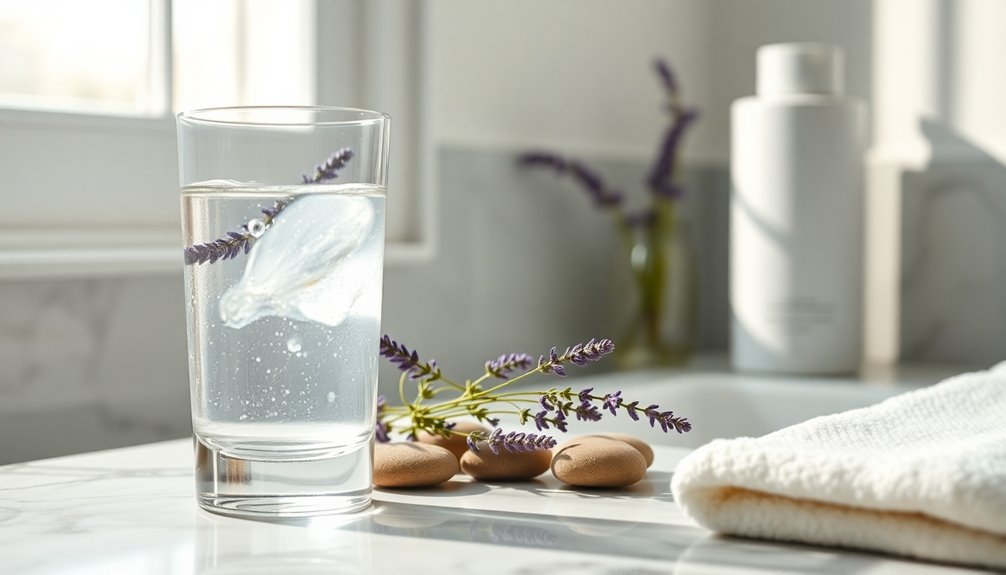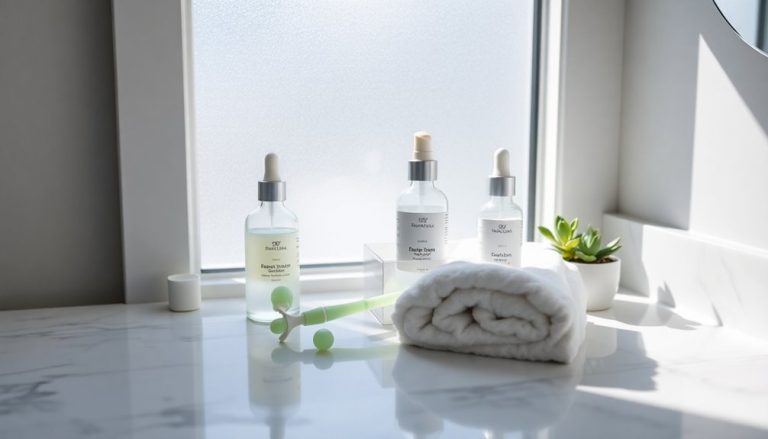If you have sensitive dry skin, you need a careful hydration routine. Start by using gentle cleansers that won't strip away natural oils. Moisturize twice daily with products containing hyaluronic acid, glycerin, and aloe vera. Don't forget to drink plenty of water, aiming for at least eight glasses a day. Using a humidifier can help maintain moisture in dry air, especially at night. Finally, steer clear of fragrances and harsh additives. Remember, your skin can react differently, and keeping a consistent routine will yield the best results. Stick around, and you'll find even more helpful tips.
Key Takeaways
- Use gentle, hydrating cleansers free from sulfates and fragrances to avoid further drying out sensitive skin.
- Incorporate moisturizing ingredients like hyaluronic acid and glycerin into your skincare routine for optimal hydration.
- Drink plenty of water daily, aiming for at least 8 glasses, to support overall skin hydration.
- Utilize a humidifier in your home to maintain moisture levels in the air, particularly during dry seasons.
- Apply a broad-spectrum sunscreen daily to protect sensitive skin from UV damage and environmental stressors.
Understand Your Skin Type
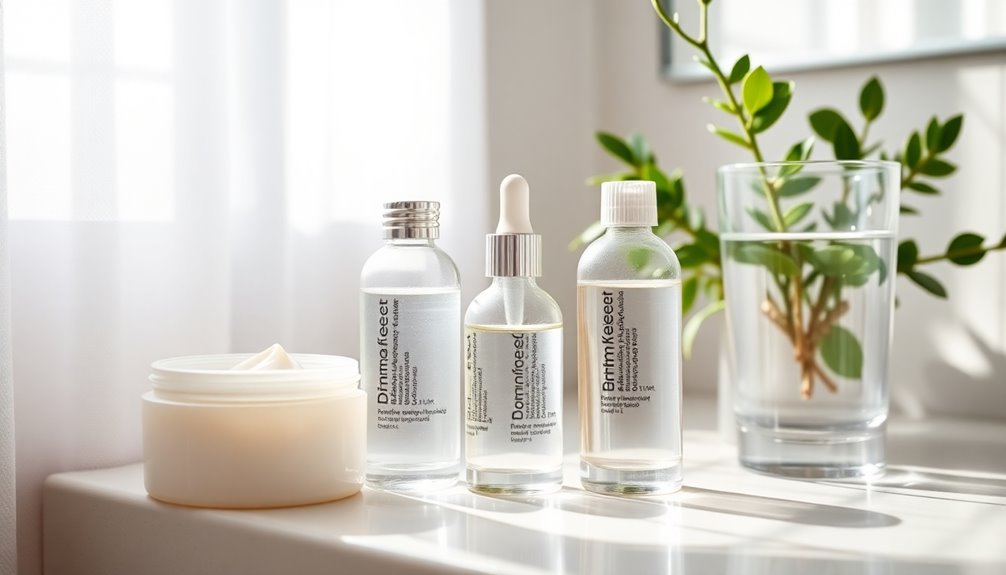
Understanding your skin type is crucial for effective hydration, especially if you have sensitive dry skin. Recognizing the unique characteristics of your skin can help you tailor your hydration routine to meet its specific needs.
Sensitive dry skin typically feels tight, flaky, or rough, and you might notice redness or irritation. These signs indicate that your skin barrier is compromised and requires extra care. Incorporating products like Hyaluronic Acid serums can provide essential moisture and help to restore your skin barrier.
To determine your skin type, observe how your skin reacts to different environmental factors or products. For instance, if your skin feels tight after cleansing or often reacts negatively to certain ingredients, you're likely dealing with sensitivity.
It's also important to note that your skin type can change seasonally or due to lifestyle factors like diet and stress. Additionally, incorporating products like Vitamin C serums can significantly enhance your skin's hydration and overall health.
Choose Gentle Cleansers
When dealing with sensitive dry skin, opting for gentle cleansers can make a significant difference in your hydration routine. Harsh cleansers often strip your skin of its natural oils, exacerbating dryness and irritation.
Instead, look for products labeled as "gentle," "hydrating," or "for sensitive skin." These formulations usually contain soothing ingredients like aloe vera, chamomile, or glycerin, which help maintain your skin's moisture barrier. Additionally, consider incorporating charcoal face masks into your routine, as they can help draw out impurities while being gentle on sensitive skin.
Avoid cleansers with sulfates, fragrances, or alcohol, as these can further irritate your skin. Instead, choose cream or lotion-based cleansers that provide a comforting touch. A pH-balanced formula is also beneficial, as it helps keep your skin's barrier intact.
When cleansing, remember to use lukewarm water, as hot water can dry out your skin. Gently massage the cleanser onto your face with your fingertips, avoiding any rough scrubbing.
Rinse thoroughly and pat your skin dry with a soft towel—don't rub, as this can irritate sensitive areas. Incorporating an exfoliating scrub product into your routine can also enhance your skin's texture and hydration.
Moisturize Regularly
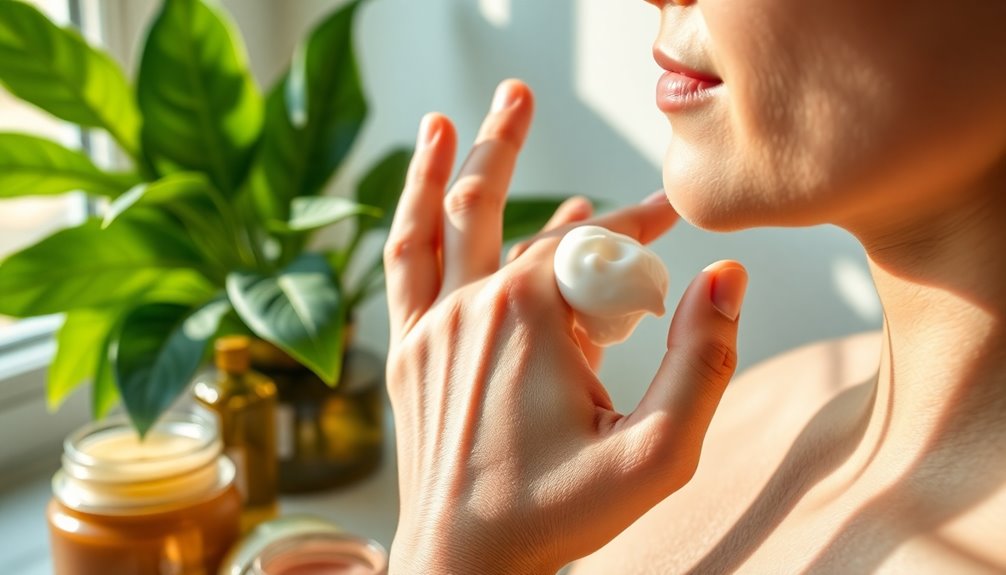
To keep your sensitive dry skin hydrated, moisturizing regularly is essential. Applying a good moisturizer not only locks in moisture but also creates a protective barrier against environmental irritants.
Choose a moisturizer that's specifically formulated for sensitive skin, as this will help minimize the risk of irritation. Look for ingredients like hyaluronic acid, glycerin, and ceramides, which are known for their hydrating properties. Using a hyaluronic acid face mist can provide an extra layer of hydration throughout the day.
Make it a habit to moisturize your skin at least twice a day—once in the morning and once before bed. After cleansing, your skin is most receptive to hydration, so apply your moisturizer while your skin is still slightly damp. This technique helps seal in moisture more effectively.
Don't forget to pay attention to areas that often get neglected, like elbows, knees, and hands. Keep a smaller tube of moisturizer handy in your bag or at your desk to remind yourself to reapply throughout the day when needed.
Drink Plenty of Water
Staying hydrated is crucial for maintaining healthy skin, especially if you have sensitive dry skin. Drinking plenty of water helps your skin retain moisture and can significantly improve its texture and appearance.
When you're adequately hydrated, your skin is less likely to become flaky, irritated, or prone to redness.
Here are some simple tips to help you drink more water daily:
- Set a Daily Goal: Aim for at least 8 glasses of water a day. You can adjust this based on your activity level or climate.
- Carry a Water Bottle: Keep a reusable water bottle with you at all times. Having it in sight serves as a reminder to sip throughout the day.
- Infuse Your Water: If plain water doesn't excite you, try adding slices of fruits, herbs, or even cucumber to enhance the flavor.
- Track Your Intake: Use an app or a journal to monitor your water consumption. Seeing your progress can motivate you to keep going.
Use Humidifiers

Humidifiers can be a game-changer for those with sensitive dry skin. They add moisture to the air, helping to combat dryness that can exacerbate skin sensitivity. By maintaining a comfortable humidity level in your home, you can create an environment that's more accommodating to your skin's needs.
When the air is dry, especially during winter months or in arid climates, your skin can lose moisture rapidly. This loss can lead to irritation, flakiness, and discomfort. Using a humidifier helps to restore some of that lost moisture, making your skin feel softer and more hydrated.
Place a humidifier in your bedroom, as this is where you spend a significant amount of time. Running it while you sleep can do wonders for your skin overnight.
Just remember to keep the unit clean to avoid mold and bacteria growth, which can trigger allergic reactions or worsen skin conditions.
Experiment with different settings to find what works best for you. Regularly monitor humidity levels, aiming for around 30-50% for optimal skin hydration.
With a little effort, you'll notice a significant improvement in your skin's health and comfort.
Avoid Hot Showers
How often do you find yourself craving a long, hot shower after a long day?
While it feels soothing, especially for sensitive dry skin, hot showers can actually do more harm than good. They strip your skin of its natural oils, leaving it even drier and more irritated.
Instead, consider these tips to help maintain your skin's hydration:
- Opt for Warm Water: Use lukewarm water instead of hot to prevent excessive moisture loss.
- Limit Shower Time: Keep your showers short—aim for 5 to 10 minutes—to reduce skin exposure to water.
- Moisturize Immediately: Apply a hydrating lotion or cream right after you towel off to lock in moisture.
- Use Gentle Cleaners: Choose mild, hydrating cleansers that won't leave your skin feeling stripped or tight.
Opt for Fragrance-Free Products
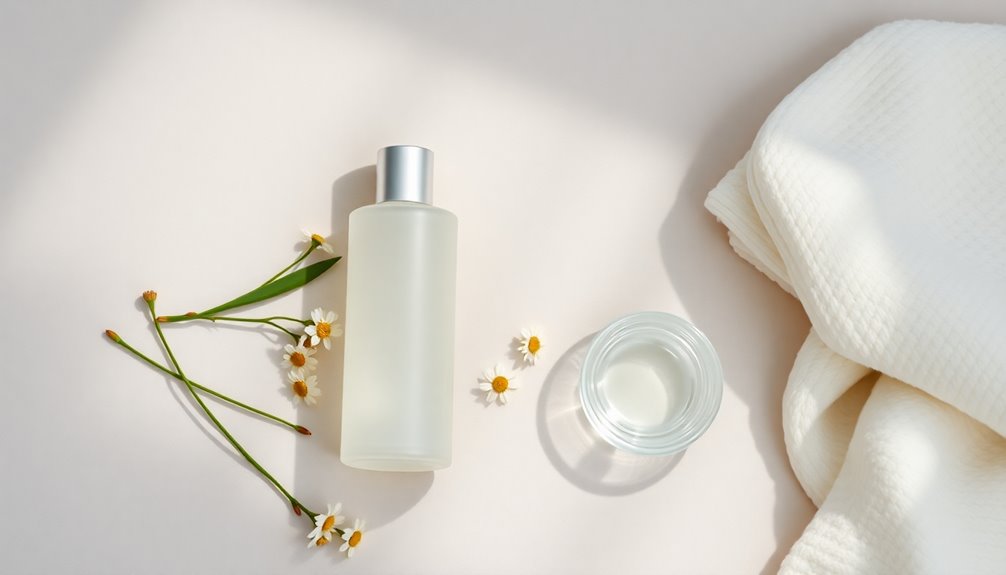
When choosing skincare products for sensitive dry skin, opting for fragrance-free options is crucial. Fragrances, whether natural or synthetic, can trigger irritation and exacerbate dryness. Your skin needs gentle care, and fragrance-free products minimize the risk of allergic reactions or sensitivities.
Many popular skincare brands include added fragrances to enhance the scent of their products. However, this added fragrance can often lead to discomfort, redness, or an itchy sensation. Instead, look for labels that clearly state "fragrance-free" or "unscented." These products are formulated without unnecessary irritants, allowing your skin to stay calm and hydrated.
You might also find that fragrance-free products often contain fewer ingredients, which is beneficial for sensitive skin types. By choosing products with simple formulations, you reduce the chances of introducing potential irritants into your routine.
Always read ingredient lists carefully, and don't hesitate to try samples if available. Your skin deserves the best, and selecting fragrance-free options can significantly improve its hydration and overall health.
It's a small change that can lead to a big difference in how your skin feels and looks.
Incorporate Hydrating Ingredients
To effectively combat dryness and soothe sensitive skin, incorporating hydrating ingredients into your skincare routine is essential.
These ingredients can help lock in moisture and provide relief from irritation. Here are four key ingredients you should consider:
- Hyaluronic Acid: This powerhouse ingredient can hold up to 1,000 times its weight in water, making it a must-have for intense hydration.
- Glycerin: A natural humectant, glycerin draws moisture from the air into your skin, helping to keep it plump and hydrated.
- Aloe Vera: Known for its soothing properties, aloe vera not only hydrates but also calms irritated skin, making it ideal for sensitive types.
- Ceramides: These lipids help restore the skin barrier, preventing moisture loss and ensuring your skin stays hydrated throughout the day.
Protect From Environmental Stressors
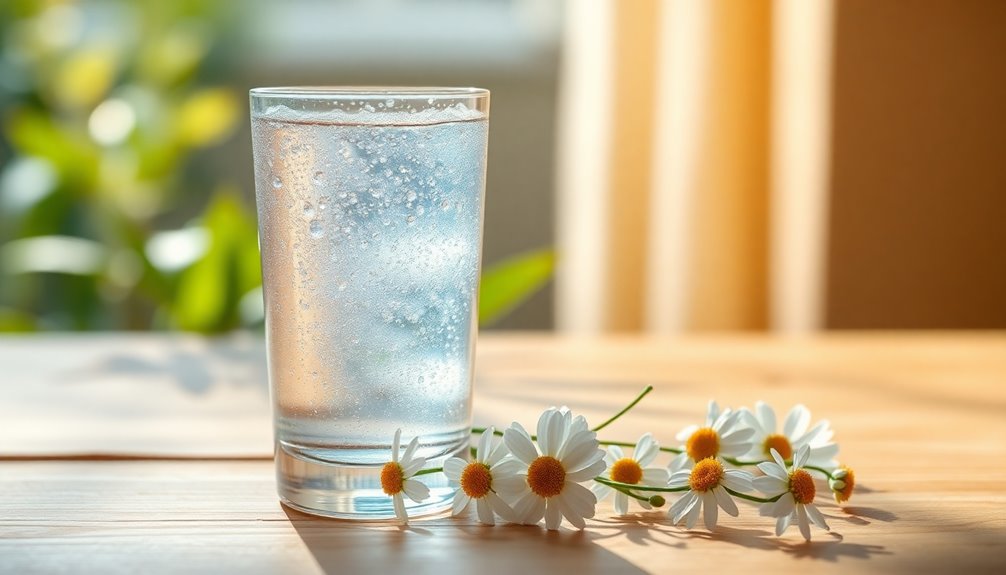
Shielding your skin from environmental stressors is crucial for maintaining hydration and preventing irritation. Everyday factors like pollution, harsh weather, and UV rays can wreak havoc on sensitive, dry skin.
To combat these issues, start by incorporating a broad-spectrum sunscreen into your daily routine. Even on cloudy days, UV rays can penetrate the skin, leading to moisture loss and irritation.
When heading outside, consider wearing protective clothing such as hats and long sleeves. This can help shield your skin from direct exposure to harmful elements. If you live in a particularly dry or windy climate, using a barrier cream can create an additional layer of protection against environmental aggressors.
Indoor environments can also be detrimental. Utilize a humidifier to maintain moisture levels, especially during winter months when heating systems can dry out the air.
Additionally, try to avoid prolonged exposure to hot water while bathing, as it can strip your skin of its natural oils.
Consult a Dermatologist
Environmental stressors can take a toll on sensitive, dry skin, making it even more important to seek professional guidance. Consulting a dermatologist is crucial for developing a personalized skincare routine that addresses your specific needs.
Here are some reasons why you should make that appointment:
- Expert Advice: Dermatologists understand skin types and can recommend products tailored to your sensitive skin.
- Identify Underlying Issues: They can help identify any underlying conditions that might be contributing to your dryness, such as eczema or psoriasis.
- Customized Treatment Plans: A dermatologist can create a customized treatment plan, including prescription moisturizers or medications if necessary.
- Ongoing Support: Regular visits allow for adjustments in your skincare regimen based on how your skin responds over time.
Don't hesitate to seek help. By consulting a dermatologist, you can gain valuable insights and effective strategies to manage your sensitive, dry skin.
This proactive approach not only improves your skin health but also boosts your confidence. Remember, you don't have to navigate this journey alone; professional guidance is just a consultation away!
Frequently Asked Questions
Can Diet Affect Sensitive Dry Skin Hydration Levels?
Imagine your skin as a sponge. If you're not feeding it the right nutrients, it can't soak up moisture effectively. Your diet directly influences hydration levels, so what you eat really matters for your skin's health.
How Can Stress Impact Dry Skin Conditions?
Stress can trigger inflammation and disrupt your skin's natural barrier, which leads to increased dryness and irritation. You might notice more flakiness or redness when stress levels rise, making it essential to manage stress effectively.
Are There Specific Fabrics That Irritate Sensitive Skin?
Certain fabrics, like wool or synthetic materials, can irritate your sensitive skin. You should opt for soft, breathable fabrics like cotton or bamboo to minimize discomfort and keep your skin feeling comfortable and healthy.
What Role Does Sleep Play in Skin Hydration?
Think of your skin as a garden. When you sleep, it receives nourishment, allowing cells to repair and rejuvenate. Without enough sleep, your skin can become parched, losing its natural glow and hydration.
Can Supplements Improve Hydration for Sensitive Skin?
Supplements can enhance your skin's hydration by providing essential nutrients, like omega-3 fatty acids and antioxidants. They support your skin's barrier, helping retain moisture and improve overall texture. Just ensure you consult a healthcare professional first.
Conclusion
Taking care of sensitive dry skin doesn't have to be complicated. Remember, "an ounce of prevention is worth a pound of cure." By understanding your skin type and incorporating gentle products, you can keep your skin hydrated and healthy. Regularly moisturizing, drinking water, and using humidifiers will make a difference. Don't forget to protect your skin from environmental stressors. If you're ever unsure, consulting a dermatologist can help you find the best routine tailored just for you.

